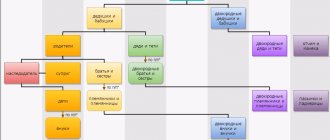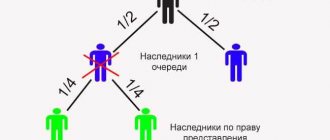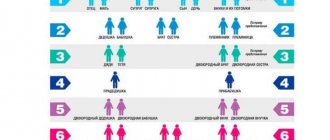Inheritance by will has not yet become an everyday reality in Russia. If the inheritance is “ordinary” - an apartment, a dacha, a car, and so on, people usually “don’t bother” to distribute it all among the heirs. They say they will figure it out themselves.
Whether this is good or bad is not the point. “Fights at the coffin” happen regardless of whether property is distributed by will or law. It all depends on family relationships. The fact is that inheritance by law is the most common method in our country. Let's discuss it.
So, the basic principles of legal inheritance are as follows:
- Marital and family relationships are a priority
- The law defines an exhaustive circle of heirs - 7 lines
- Norms and rules determine the conditions for the transfer of inheritance rights sequentially from one queue to another
- Representatives of one line divide the inherited property equally among themselves (there are exceptions in cases of application of the right of representation)
Let's find out how these principles are implemented in practice.
Order of heirs
Stage II siblings of the deceased (full and half-blood), parents of parents (grandparents)
| Stage I | parents, spouses, children (adopted and foster children are treated as blood) |
| Stage III | siblings of the deceased's parents (aunts and uncles) |
| Queue IV | great-grandparents (third degree of relationship) |
| Queue V | siblings of grandparents (older cousins), children of nephews and nieces, they are also cousins (fourth degree of kinship) |
| Queue VI | fifth degree of kinship, cousins: uncles, aunts, nephews, nieces, great-grandchildren, great-granddaughters, their descendants (by nomination). This is the last line of blood relatives. |
| Queue VII | stepfather, stepmother, unadopted children of spouses from other marriages (stepsons and stepdaughters) |
There is another special category of heirs, prescribed in Article 1148 of the Civil Code of the Russian Federation.
We are talking about disabled dependents who lived at the expense of the testator until his death and at least a year before that. If there are no successive heirs, they are considered the 8th line receiving inheritance rights. If there are heirs of previous queues, the category of disabled dependents inherits on an equal basis with the queue called for inheritance.
Can they receive a mandatory share?
Great-grandparents are not distinguished by their youth. Often such persons have the status of disabled persons - those who have retired due to old age. Often, heirs of the 4th line of kinship are dependent on their relatives. If such relatives are great-grandchildren and great-granddaughters, pensioners can count on a mandatory share in the inheritance (Article 1148 of the Civil Code of the Russian Federation).
The obligatory share due to dependency is due to persons who were supported by the testator and lived with him during the last year . Even if the deceased great-grandson left a will in which the dependent was not mentioned, the great-grandfather or great-grandmother will receive a mandatory share.
The size of the inheritance is much less than what the next-ranking applicants will receive. However, dependents are entitled to ½ part of what they would have received by law (clause 1 of Article 1149 of the Civil Code of the Russian Federation).
Example:
A young entrepreneur died and his wife, daughter and father took over the inheritance. However, the notary became aware of one more heir - the great-grandmother of the deceased. It turned out that her great-grandson took her as his dependent, settled her in his apartment, looked after her and provided for her existence. The pensioner received a meager pension, so she did not refuse help. The notary explained to the heirs that the great-grandmother was entitled to a mandatory share in the inheritance. He suggested that the pensioner herself collect evidence: certificates of residence, payment receipts, checks, witness statements. The great-grandmother could not do this due to her age, so her children helped her. Soon the evidence was collected, and the pensioner received ½ of her allotted share. The wife, daughter and father of the deceased great-grandson inherited the rest of the property.
Transfer of inheritance rights from one queue to another
The transition through queues is regulated by Articles 1113 and 1114 of the Civil Code of the Russian Federation. The queues of heirs successively replace each other if:
- It is notarized that there are no priority heirs. For example, if the parents and spouse have already died and there were no children
- Representatives of the previous line do not have the right of inheritance. In particular, parents who have been deprived of parental rights. Or representatives of the current queue are recognized as “unworthy heirs” through the court. This can happen if they are proven to have maliciously evaded the maintenance of a disabled testator, caused physical or moral harm to him, etc.
- All representatives of the previous line signed a waiver of inheritance
- No one from the previous line reported their readiness to enter into inheritance rights within the period established by law
If at least one of the circumstances is present, the right of inheritance goes down the line” - passes to representatives of the next category.
Who inherits first?
Closest people: children, parents, husband or wife. The property of the deceased is divided equally between them.
ATTENTION! One clarification should be made regarding the rights of spouses. There is a legal concept of joint property of spouses. That is, not all of the testator’s property is considered his personal property. Half belongs to the husband or wife. Therefore, first, half of the marital share is allocated, and the rest is divided among all first-degree heirs, including the spouse. That is, in practice, the husband or wife receives a larger share of the inheritance than children and parents.
However, in order to inherit from each other, spouses must have a legally registered relationship.
If at the time of the death of one of them, the marriage is legally dissolved, the second spouse is deprived of the right to inherit, even in the case of actually living together and running a joint household.
The only exceptions are cases where the undocumented spouse can be considered a disabled dependent. But the “married half” is not allocated, and the share will be lower.
Parents inherit if they are not deprived of parental rights (an exception, again, may be if the disabled parent is dependent on the deceased). Adoptive parents are equal in law to natural parents.
Children have equal rights to the parent's inheritance. It doesn’t matter if they were born in a current marriage, in a previous marriage, or out of wedlock.
Even if at one time the testator was deprived of parental rights to one of the children, the latter still has the right to inherit, along with the others.
If the testator's children died before him, the right of inheritance passes to their children (grandchildren of the deceased) through the right of representation.
Judicial practice under Article 1146 of the Civil Code of the Russian Federation
Determination of the Judicial Collegium for Civil Cases of the Supreme Court of the Russian Federation dated 08/06/2019 N 64-KG19-3
In accordance with paragraph 1 of Article 1146 of the Civil Code of the Russian Federation, the share of an heir by law who died before the opening of the inheritance or at the same time as the testator (paragraph 2 of Article 1114), passes by right of representation to his respective descendants in the cases provided for in paragraph 2 of Article 1142, paragraph 2 of Article 1143 and paragraph 2 of Article 1144 of the said Code, and is divided equally between them.
Second stage
Next come the grandparents and siblings of the testator.
Siblings are all children of the same parents. The right of inheritance is enjoyed by both full-born (siblings) and half-born (half- or uterine) siblings who have a different father or mother.
ATTENTION! The main basis for second-order inheritance is family ties. Half-brothers and sisters (if the parents marry having children from previous marriages) are legal heirs only if adopted by the parent for whom they were not relatives. In this case, the family relationship is replaced by a legal one. Officially, non-adopted half-siblings do not have the right to inherit from each other.
The same goes for grandparents. If they were not the blood parents of the testator’s father or mother, they will be second-order heirs only if they are officially adopted.
If the brothers and sisters have already died, the inheritance passes to their children by right of representation.
Procedure
To register an inheritance, the nephew must act as follows:
- Collect supporting documentation.
- Submit an application to the notary office at the place where the inheritance was opened.
- Conduct a property assessment.
- Pay the fee.
- Submit an application to the notary's office to obtain a certificate of inheritance rights.
- Register inherited property.
Deadlines for accepting an inheritance
The procedure for registering an inheritance is no different from the standard scheme. Regardless of the reasons for accepting an inheritance, the deadlines for registering property remain general.
Nephews are given 6 months to apply. Missing deadlines is fraught with loss of property rights. Their restoration is carried out through the courts.
State duty for nephews
One of the key points when registering an inheritance is the state duty. The amount of the fee depends on the degree of relationship with the deceased citizen and the value of the property that is due to the heir.
Brothers and sisters are considered beneficiaries and pay a state duty of 0.3% of the value of the objects received. This rule does not apply to their children.
They pay the duty at the general rate provided for all other recipients. It is 0.6% . The total amount cannot exceed RUB 1,000,000.
Conditions for inheritance by dependents
The very fact that the dependent was supported by the testator must be proven. The following documents are required:
- Documentary evidence of incapacity for work (pension certificate, disability certificate)
- Documentary proof of residence with the testator (if the dependent is not a relative or a relative so distant that he is not included in any line, it is also necessary to prove that he lived with the testator for a year or more, until the day of his death)
Right of representation
When people first read the list of inheritance queues, they are often perplexed: “How can this be, where are the grandchildren? And why are there aunts and uncles, but no cousins in any of the queues?
This is due to the concept of the right of representation. In essence and logic, grandchildren are heirs “directly,” that is, in the first place. But only after the inheritance passes successively to the children and then to the grandchildren. Grandchildren can inherit directly from their grandparents only if their parent-heir died before receiving the inheritance from their parents.
The same applies to the children of the testator's siblings. Nieces and nephews become second-degree heirs if the siblings predecease the testator. This is the right of representation.
The inheritance share by right of representation corresponds to the share that the original heir would have received. That is, two grandchildren will share the share of their father or mother, and three nephews will share the share of the testator’s sibling. However, the only heir by right of representation receives exactly the same share as the share of the other heirs of the given order.
This procedure for the right of representation applies to all related queues. In the 6th line, this could be the grandson of a cousin's grandson or the great-granddaughter of a great-aunt.
Commentary to Art. 1146 Civil Code of the Russian Federation
1. When inheriting by right of representation, the share of an heir by law who died before the opening of the inheritance or at the same time as the testator passes by right of representation to his descendants, directly specified in the law (clause 1 of the commentary article). The heir, by right of representation, seems to take the place of his deceased ancestor, who would have inherited within the appropriate line if he had been alive.
Inheritance by right of representation is a special procedure for calling a kind of “spare” heirs to inherit within the same line, when there are no living immediate heirs in a direct ascending line, and in this sense it has similarities with the rules on the sub-appointment of an heir, which relate to inheritance by will. However, due to the peculiarities of inheritance by law, which is based only on the implied will of the testator, these institutions differ significantly from each other. Thus, the testator has the right, at his own discretion, to indicate in the will any other heir in the event that the heir appointed by him in the will or the heir of the testator by law dies before the opening of the inheritance, either simultaneously with the testator, or after the opening of the inheritance, without having time to accept it, or does not accept it inheritance for other reasons or refuses it, or will not have the right to inherit or will be excluded from inheritance as unworthy. Not just anyone can inherit by right of representation, but only those directly specified in the law and only in the cases and in the manner specified in the commentary. Art.
Despite the similarity of names, the rules on inheritance by right of representation have nothing to do with relations of representation (Chapter 10 of the Civil Code). Objectively, this could not have happened, since relations of representation with the deceased are impossible (see Article 188 of the Civil Code), and taking the place of the deceased heir is not associated with the implementation and (or) protection of his rights and interests. A person called to inherit by right of representation becomes an independent heir and exercises his own rights in relation to the share in the inheritance that would have been due to the deceased descendant. That is why the provisions on inheritance by right of representation do not contradict paragraph 2 of Art. 1114 of the Civil Code and do not cancel the rule established by it that persons who die on the same day (commorients) do not inherit from each other.
Inheritance by right of representation must also be distinguished from hereditary transmission, i.e. from the transfer of the right to accept an inheritance (Article 1156 of the Civil Code), which is associated with the situation when the heir was alive on the date of opening of the inheritance, but did not have time to accept the share due to him, and therefore does not mediate the implementation by the heirs of the transmitter of independent rights in relation to this share.
2. Taking into account the provisions of the comment. Art. and art. Art. 1142 - 1144 of the Civil Code, the features of inheritance by right of representation are as follows.
Inheritance by right of representation is possible only within the first three succession lines. Heirs by right of representation are grandchildren and their descendants (first priority), nephews and nieces (second priority), cousins (third priority). As can be seen, the legislator, guided by the principle of protecting the rights of close relatives, classified as heirs by right of representation only the descendants of heirs in a direct descending line (for example, nephews and nieces are the children of full and half brothers and sisters of the testator). The law does not connect the possibility of inheritance by right of representation with criteria such as disability, cohabitation, etc.
Along with grandchildren, their descendants can be heirs of the first priority by right of representation. However, the legislator did not include descendants in the other two groups of heirs by right of representation. Since the rules on inheritance by law are not subject to broad interpretation, the descendants of nephews and nieces (cousins and granddaughters) and cousins (cousins and nieces) inherit in the order of the fifth and sixth lines of succession, respectively (paragraphs 3, 4 p. 2 Article 1145 Civil Code).
As for the descendants of grandchildren, they are called upon to inherit by right of representation if their parent, i.e. the grandson of the testator also died before the opening of the inheritance or at the same time as the testator. Despite the fact that in fact the circle of heirs by right of representation is only relatively closed (the degree of kinship of the possible descendants of a grandson is not limited), it is obvious that due to the biological life expectancy, descendants of several subsequent degrees of kinship can theoretically be called upon to inherit by right of representation within the first stage ( i.e. great-grandchildren, great-great-grandchildren, great-great-great-grandchildren).
3. By inheriting by right of representation, the descendants of the deceased heir become immediate heirs of a particular line and therefore exclude from inheritance all other persons included in subsequent lines. For example, if the testator has only a grandson, as well as a brother and nephew, alive, then the grandson, as the heir of the first priority, excludes from inheritance the persons included in the subsequent queues, including heirs by right of representation.
4. Considering that the heirs by right of representation replace the heir who died before the opening of the inheritance or at the same time as the testator, for the purposes of calling for inheritance by right of representation, the legislator attaches legal significance to the circumstances that annul the inheritance rights of the deceased heir. So, according to paragraphs 2, 3 comments. Art. the descendants of the deceased heir are not called to inherit (clauses 2, 3 of Article 1146 of the Civil Code) if the latter was deprived of the inheritance by the testator (clause 1 of Article 1119 of the Civil Code) or would not have the right to inherit as an unworthy heir (clause 1 of Art. 1117 Civil Code). The literature rightly states that the rule in para. 2 p. 1 art. 1117 of the Civil Code on recognition as unworthy heirs due to deprivation of parental rights has no relation to heirs by right of representation, since parents cannot be the last (see: Commentary on the Civil Code of the Russian Federation, part three (article-by-article) / Edited by A.L. Makovsky , E.A. Sukhanova. M., 2002. P. 164 (commentary author - A.L. Makovsky)).
Unfortunately, the legislation has not resolved the issue of whether the recognition of a deceased descendant as unworthy on the basis of clause 2 of Art. affects the rights of heirs by right of representation. 1117 of the Civil Code due to failure to fulfill the obligations imposed by law to support the testator. If we take into account that heirs by right of representation take the place of their parents, the answer is yes. The problem is that in paragraph 3 of the comment. Art. contains a reference only to clause 1 of Art. 1117 of the Civil Code, which formally and legally, due to the rules on literal interpretation, excludes the possibility of applying the norms of paragraph 2 of Art. 1117 Civil Code. Of course, we can talk about the legislator’s technical error, but a clear solution to the issue is only possible by making appropriate changes to the commentary. Art.
The question of whether an heir by right of representation can be called to inherit instead of his deceased descendant, who had the right to inherit due to the fact that the testator after such heir lost the right to inherit (i.e., committing actions entailing recognition of the heir as unworthy) is also controversial. still bequeathed his property to him. It seems that in such situations, inheritance by right of representation is impossible, since it is an institution of inheritance by law, and the receipt of property by an unworthy heir at the will of the testator is allowed only within the framework of inheritance by will (see also: Commentary on the Civil Code of the Russian Federation, part three ( article by article) / Edited by A.L. Makovsky, E.A. Sukhanov. M., 2002. P. 164 (commentary author - A.L. Makovsky).
5. When called to inherit by right of representation, the relevant persons inherit directly to the testator, whose heir could be the deceased ancestor, and exercise their own rights. It follows from this that inheritance by right of representation is carried out regardless of whether such descendants are endowed with the right to inherit from their parent within the framework of separate inheritance legal relations (i.e., it does not matter whether they are unworthy heirs in relation to their parent, whether they were deprived of the right to inherit, etc.). At the same time, since the right of representation is associated with the exercise of independent inheritance rights, inheritance on this basis is unacceptable in relation to the compulsory share due to a deceased descendant (which is explained by the inextricable connection of the right to a compulsory share with the person and with the restriction of freedom of will), as well as in those cases where the heir himself, by right of representation, was recognized as an unworthy heir in relation to the testator, was removed by the latter from inheritance (even if the deceased descendant had the right to inherit) or when the testator appointed another heir in the event of the death of the immediate heir (clause 2 of Article 1121 of the Civil Code ).
6. Since the heirs, by right of representation, take the place of their descendant, they are entitled to only that share in the inheritance that would have been due to the deceased heir. If there are several heirs by nomination, then the share of their descendant is divided equally between them. In this case, there is no infringement of inheritance rights, which is explained by the indicated features of inheritance by right of representation. For example, the testator has a surviving mother (the inheritance share is 1/2 of the estate) and two grandchildren, who inherit the share that their parent would have received (the inheritance shares are 1/4 each, i.e. half of the deceased’s share parent). If there is only one heir by right of representation, then the content of his rights in terms of the size of the due share does not differ from the rights of other heirs within the same line.
Is inheritance possible by law in the presence of a will?
Yes, this is not excluded even if there is a will. The order of inheritance by will can be changed to inheritance by law in the following cases:
- The court declared the will invalid
- The heir or heirs under the will did not show interest in the inheritance within the period allotted for this by law (6 months)
- The court found the heirs under the will unworthy
- The testator, voluntarily or unwittingly, infringed on the rights of the obligatory heirs and did not allocate the obligatory part to them, which is illegal
Right to mandatory part
Representatives of socially unprotected categories of citizens have the right to an obligatory part of the inheritance. These include minors and disabled persons.
In other words, the father has every right to “disinherit his son”, provided that the son is an adult and not disabled. The same applies to all first-line heirs. The size of the obligatory share is half of the “legal” share to which the heirs would be entitled in the absence of a will.
For example, a woman bequeathed everything to her common-law husband, without allocating anything to her elderly father. In the absence of a will, the father would be the only heir, and the common-law husband, on the contrary, would not be entitled to anything. But since the will has been drawn up, the father receives his obligatory share of 50% of the inheritance. The rest will go to the husband.
The obligatory share of the inheritance cannot be lower than the established limit. No one has the right to deprive an heir of his obligatory share. It also cannot be transferred to other applicants.
What are the grounds of inheritance
The basis of inheritance is understood as the primary reason for the transfer of the property rights of the deceased to specific recipients after the death of the owner.
The procedure for transferring rights to the property of the deceased is provided for on 2 grounds (Article 1111 of the Civil Code of the Russian Federation):
- in law;
- by will.
However, the grounds do not have legal force in themselves. For the grounds of inheritance to come into force, it is necessary:
- establish the fact of death;
- obtain a death certificate;
- open inheritance.
Property owned by the deceased at the time of death passes to his heirs. The process of accepting property is called inheritance.
A prerequisite for transferring objects by inheritance is the existence of ownership rights. The Civil Code does not provide for the possibility of inheritance for objects that a citizen used under a lease agreement for gratuitous use.
In addition to the rights, the responsibilities of the deceased are also transferred to the heirs. These include all debt obligations of a citizen that are not related to his personality.
The rights and obligations of the deceased owner can be transferred exclusively as follows:
- as a whole (inseparably);
- completely, but not exceeding the amount of property of the deceased.






